

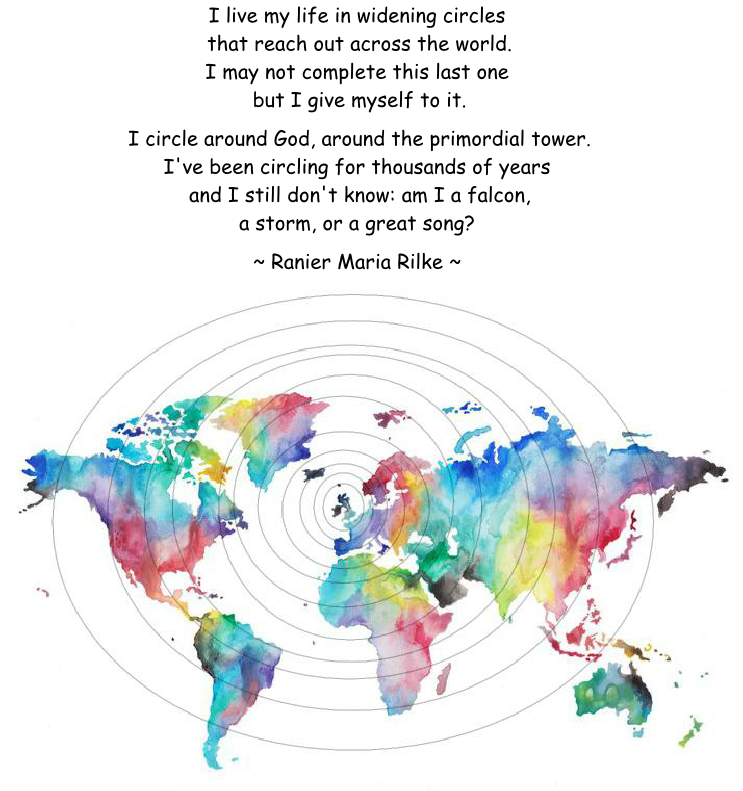
Consider the Dipper
Consider now the life of the dipper -
But the dipper is much more than this. All the time the waterfall is in its ears, an endlessly varying symphony of sound that is different for every part of the river, different at different times of the year, so different that each spot on the river could be identified by the dipper by from its distinctive harmony alone. The dipper, in a sense, is the waterfall. Its ears know nothing of any world of sound beyond the water. Its genes and proteins are so attuned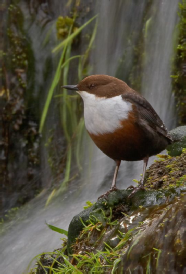 to every nuance of the movement and sound of the water and the dance of light and current; it belongs in this place so intimately that every detail is part of its being in a way that we can never really appreciate because it is so far beyond our superficial experience of a corner of the world that evolution has endowed the dipper to belong in and respond to with all the biological capacity, but very differently tuned and pitched, that we humans possess.
to every nuance of the movement and sound of the water and the dance of light and current; it belongs in this place so intimately that every detail is part of its being in a way that we can never really appreciate because it is so far beyond our superficial experience of a corner of the world that evolution has endowed the dipper to belong in and respond to with all the biological capacity, but very differently tuned and pitched, that we humans possess.
For the dipper, one stretch of stream is its entire world; it experiences no other. It reflects the ecological essence of the stream; it is its spirit.
As for its song, ‘In a general way his music is that of the streams, refined and spiritualised. The deep booming notes of the falls are in it, the trills of rapids, the gurgling of margin eddies, the low whispering of level reaches, and the sweet tinkle of separate drops oozing from the ends of mosses and falling into tranquil pools … I have often observed him singing in the midst of beaten spray, his music completely buried beneath the water’s roar; Yet I knew he was surely singing by his gestures and the movements of his bill,
John Muir The Mountains of California 1894
But the important thing here is to appreciate that the sensory capacity of the animal equips it to respond in a way which is compatible with our own human response. It might have been possible in Descarte’s day to think an animal was an elaborate piece of clockwork, that its responses were automatic, that it was incapable of feeling pain or joy, much less anything beyond. But now our science shows us that on a physical level it has everything we have, and if we can take a step far enough back to see the entire picture – to view things holistically – it is so obvious that the very purpose of these capabilities is to enable it to respond, to feel: and these feelings will include joy and pain – even if at this moment science finds it difficult to devise calipers of sufficient sensitivity to take hold of it or rulers of a sensitivity adequate to its measurements.
And with our theological spectacles on again we might say that by being in this way the dipper acclaims creation ……. Its spirit and its soul are as ours on this profound level, not in some superficial way, for truly was it created with the same loving care. The role of each and every species is not merely ecological, it is spiritual; it is an unique shout for joy, affirmation, worship that no other species can give, If any species is missing – if the dipper has become extinct say – a note which I cannot replace is missing from the symphony.
From The singing Heart of the World John Feehan

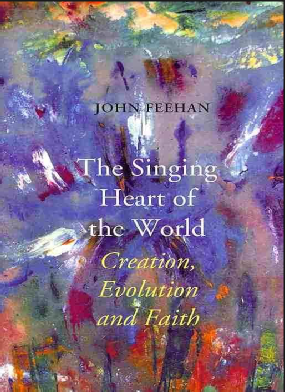
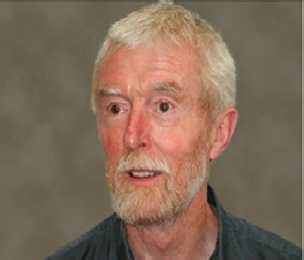
Be the Change
Notice the birds, plants, animals and even inanimate objects around you, feel their kinship and be grateful
for the ways in which this abundance loves you back
-


No matter where we live, each breath we take connects us to our oceans. Most of our oxygen is generated by them. They regulate our climate and weather, turn water into clouds that give us rain. And oceans provide a home for near 80% of all living things on earth. We can’t live without our oceans. On January 1st 2015, the World Economic Forum announced that the water crisis is the No 1 Global Risk based on impact to society
- 663 million people -
1 in 10 - lack access to safe water - One third of the global population lives without access to a toilet.
- More people in the world have a moblie phone than a toilet
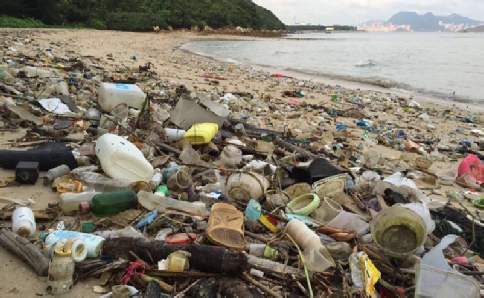
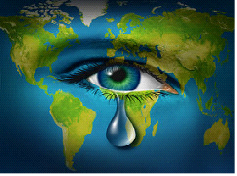
Plastics are now one of the most common pollutants of ocean waters worldwide. Pushed by winds, tides and currents, plastic particles form, with other debris, into large swirling
Did you know you may be contributing to marine pollution by washing your face: Microplastics are components in a variety of cosmetic products, such as exfoliating scrubs and toothpaste. Once these products are poured down the drain, microplastics aren't filtered out before being returned to rivers, lakes and seas. Water treatment plants are unable to keep particles out of the waste water completely.
Recent studies have found that microplastics can also get washed out of synthetic clothing, like those made of polyester or acrylic. A 2016 paper concluded that a single cycle of a washing machine could release more than 700,000 microplastic fibres into the environment We need to be educated to the dangers of using products that pose an immediate and long-
A report published in Scientific Reports shows us the reach of plastic contamination beyond fish. Researchers tested 16 sea-
The 50 kilos of water in the human body are completely replaced in the adult human 17 or 18 times per annum. Water in the earth's atmosphere is renewed every 12 days and that of the oceans every 40000 years. Volume of water in human body is 70% structured water.
What we know:
- By 2050 there will be more plastic in the ocean than fish.
- Millions of animals and fish are dying each year
- Plastic water bottles take 450 years to decompose;
- Fishing lines and nets can take up to 600 years to decompose;
- Plastic bags or balloons in the ocean are dangerous (they can look like a jellyfish meal to a sea turtle).
What we all can do:
- Reduce our use of disposable plastic products;
- Reuse and recycle what we can;
- Buy reusable grocery bags to cut down on plastic bag use;
- Spread the word about ocean plastic pollution
- Pick up litter;

RETHINK,
REDUCE,
REUSE
AND ONLY RECYCLE AS A LAST RESORT
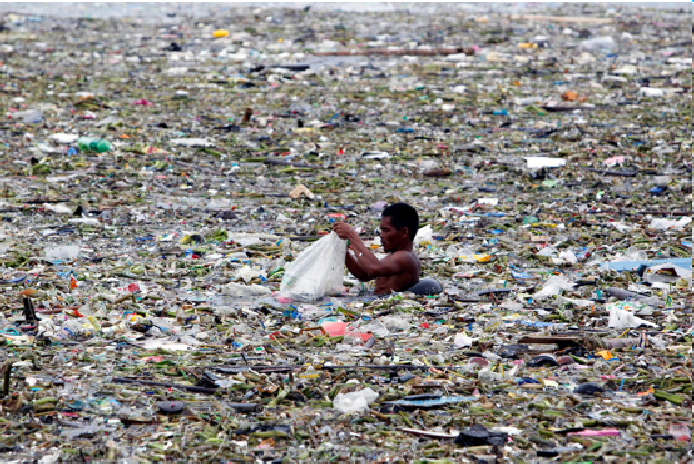
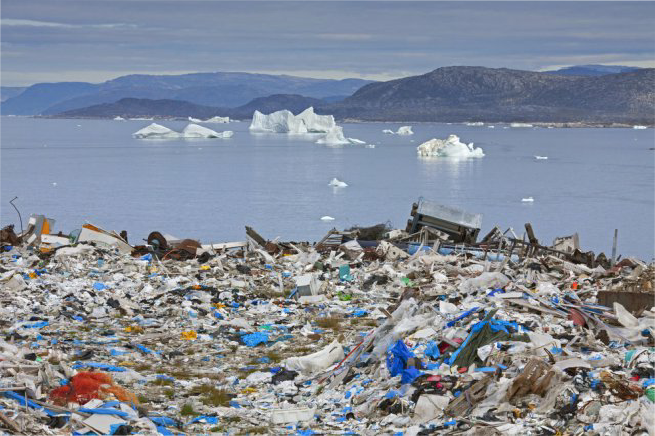
A man collects plastic and other recyclable materials from debris in the waters of Manila Bay in Manila, Philippines, July 30, 2012. Mismanaged waste from land is the primary cause of the ocean plastics crisis.
Trash builds up on the coast of Illulissat, a town in Greenland
God of love, you give us this universe filled with beauty,
help us to reverence all your creation, respecting the rights
of all species and the integrity of the elements.
Teach us to realize in our hearts, as well as in our minds,
that we praise you when we treat your gifts with love and care. May we unite with all suffering creation
in the struggle for liberation from all that seeks to destroy.
We ask this through Christ Our Lord. Amen


Pope Francis’ Challenge to Ecological Conversion
As we reflect on Laudato Si', Pope Francis' encyclical on Care for Our Common Home, we begin with the Pope's challenge to all of us to what he calls Ecological Conversion:
216. The rich heritage of Christian spirituality, the fruit of twenty centuries of personal and communal experience, has a precious contribution to make to the renewal of humanity. Here, I would like to offer Christians a few suggestions for an ecological spirituality grounded in the convictions of our faith, since the teachings of the Gospel have direct consequences for our way of thinking, feeling and living. More than in ideas or concepts as such, I am interested in how such a spirituality can motivate us to a more passionate concern for the protection of our world. A commitment this lofty cannot be sustained by doctrine alone, without a spirituality capable of inspiring us, without an “interior impulse which encourages, motivates, nourishes and gives meaning to our individual and communal activity”.[Evangelii Gaudium] Admittedly, Christians have not always appropriated and developed the spiritual treasures bestowed by God upon the Church, where the life of the spirit is not dissociated from the body or from nature or from worldly realities, but lived in and with them, in communion with all that surrounds us.
217. “The external deserts in the world are growing, because the internal deserts have become so vast”.[P. Benedict] For this reason, the ecological crisis is also a summons to profound interior conversion. It must be said that some committed and prayerful Christians, with the excuse of realism and pragmatism, tend to ridicule expressions of concern for the environment. Others are passive; they choose not to change their habits and thus become inconsistent. So what they all need is an “ecological conversion”, whereby the effects of their encounter with Jesus Christ become evident in their relationship with the world around them. Living our vocation to be protectors of God’s handiwork is essential to a life of virtue; it is not an optional or a secondary aspect of our Christian experience.
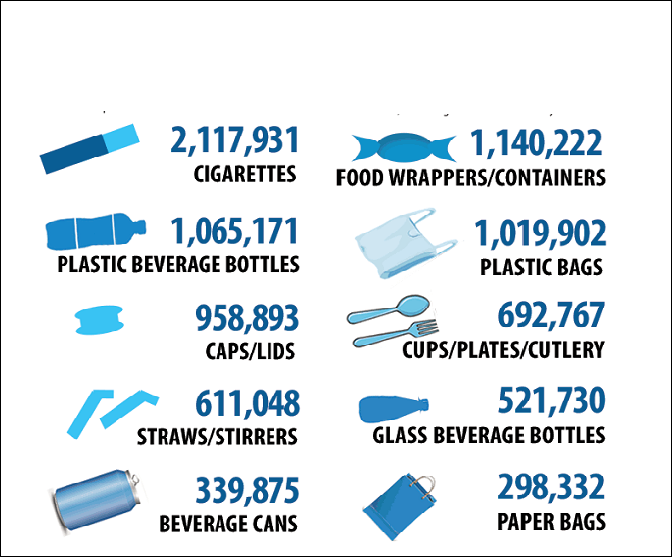
Top 10 Trash Items Found in the World’s Oceans
in Last Years Annual Cleanup
glutinous accumulation zones, known to oceanographers as gyres, which comprise as much as 40 percent of the planet’s ocean surface
